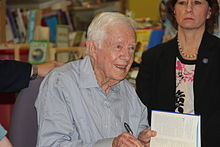By Moshe Phillips and Benyamin Korn

PHILADELPHIA –As debate rages over a new documentary about the “honor killings” of women by Islamic extremists around the world, former president Jimmy Carter has weighed in — and not on the side of oppressed women.
The film, Honor Diaries, is being denounced by Islamist activists such as the Council on American Islamic Relations (CAIR) — not because the documentary is inaccurate, but because its accurate portrayal of the Muslim persecution of women is so unflattering to the Islamic world.
In the midst of the “honor killing” controversy comes the release of Carter’s new book decrying the abuse of women throughout the world. Well, not quite everywhere around the world: there is one place which, despite a recent 100% increase in the murders of innocent women, does not merit even a single mention in the ex-president’s book — the territories controlled by the Palestinian Authority.
At first glance, this omission might seem strange. Carter, after all, has devoted much of his post-presidential career to speaking out about what he claims is the mistreatment of the Palestinian Arabs by Israel. But for some reason, when it comes to the mistreatment of Palestinian women by fellow-Palestinians, Carter has nothing to say–even in a book that is ostensibly devoted to the problem of violence against women.
The Palestinian women in question, like the other women depicted in the Honor Diaries film, were the victims of what are known as “honor killings.” These cases involve men murdering female relatives whom they suspect of violating Islamic fundamentalist morals. Some of the women are believed to have committed adultery, or premarital relations. Sometimes their crime is that they dress “provocatively” or were seen in the company of an unauthorized boyfriend. They are murdered in order to “preserve” the family’s honor.
In 2012, thirteen such murders were reported in the West Bank territories controlled by Palestinian Authority. Last year, the number of victims more than doubled, to 27, according to the Washington Post. And those are just the ones that we know about.
The Post notes that in addition to killings over suspected morality violations, sometimes the violence is a way to hide the fact that the women were raped or molested by their relatives. In other cases, the “honor killings” are actually related to inheritance disputes or simply “the desire to punish female independence.”
The injustice does not end there. It extends to the way the Palestinian legal system deals with the murderers. The Palestinian Authority’s official legal code actually includes laws “that guarantee light sentences for honor killings,” the Post notes. And even when the killers are punished, “pardons and suspended sentences are common.”
Jimmy Carter’s new book, A Call to Action: Women, Religion, Violence, and Power has 18 chapters. The one about “honor killings” is the shortest–less than three pages long. At the end of the book, the former president presents a long list of steps that should be taken to protect women against discrimination and violence. There are 23 recommendations. “Condemn and outlaw honor killings” is number 23.
The problem is not just that Carter gives short shrift to such a serious and worsening crisis, although that is bad enough. But what little he does write about the issue is, frankly, appalling. He begins, not with a description of the prevalence of honor killings in Arab and Muslim countries but, rather, by announcing that the phenomenon of honor killings “has a justification in the ancient Holy Scriptures of Jews and Christians.” He then quotes a verse from Deuteronomy prescribing capital punishment for certain instances of adultery. He does not bother to explain that the verse in question, like other biblical references to capital punishment for various crimes, pertained to ancient times and are obviously not carried out in our day and age.
The ex-president then mentions an example of an honor killing in Saudi Arabia and another in Pakistan, and praises the leaders of Jordan for supposedly trying to combat the problem (but “strong community beliefs” still support the practice, he notes), before hurrying to cast the net of culpability as wide as possible, emphasizing that such killings have been carried out by Hindus and Sikhs, too.
But Palestinians? Whose number of honor killings has increased the most (percentage wise) and the fastest than perhaps any other in the world? Not a word.
Carter does, however, have quite a bit to say about the way Israeli Orthodox Jews treat women. He spends almost two pages –nearly as much space as devoted to the entire topic of honor killings– berating Israel’s fervently Orthodox for supposedly considering women “inferior” (they do not) and for preferring to sit separately from women on buses.
Whatever one thinks of the bus seating controversy, it hardly belongs in a book that focuses on violence against women. Nobody has ever been killed or injured in a bus seating dispute in Israel. And Israeli law, unlike that of the Palestinian Authority, does not ensure light sentences for men who harm women.
One would prefer to give a former president the benefit of the doubt. One would like to assume that, deep down, Jimmy Carter really does feel genuine sympathy for the plight of Palestinian women under the Palestinian Authority. But his silence over Palestinian honor killings, combined with his constant and harsh denunciations of Israel, suggests that Carter only cares about Palestinians when he can use them as a whip with which to lash Israel. When Palestinians are the victims of other Palestinians, they just don’t serve his purpose.
*
Moshe Phillips is president of the Religious Zionists of America, Philadelphia Chapter; Benyamin Korn, the former executive editor of the Philadelphia Jewish Exponent, is chairman of the RZA-Philadelphia / http://www.phillyreligiouszionists.org/